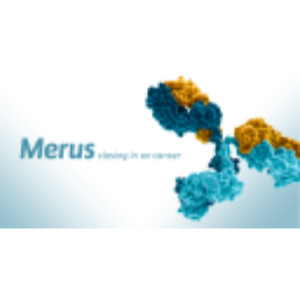Merus Announces Presentation of Phase 1 Clinical Data for MCLA-158 at the American Society of Clinical Oncology (ASCO) 2021 Gastrointestinal Cancers Symposium
Merus N.V. (MRUS) announced the presentation of clinical data from its Phase 1 dose escalation study of MCLA-158 at the ASCO 2021 Gastrointestinal Cancers Symposium, scheduled from January 15-17, 2021. MCLA-158, a bispecific antibody targeting EGFR and LGR5, was reported to be well-tolerated, successfully reaching the recommended phase 2 dose. The ongoing dose expansion phase includes patient enrollment for gastric and other non-CRC cancers, indicating progress in their clinical development efforts.
- MCLA-158 treatment well tolerated in patients.
- Reached recommended phase 2 dose.
- Ongoing dose expansion phase with new patient enrollment.
- None.
Insights
Analyzing...
UTRECHT, The Netherlands and CAMBRIDGE, Mass., Jan. 11, 2021 (GLOBE NEWSWIRE) -- Merus N.V. (Nasdaq: MRUS) (“Merus”, “the Company”, “we”, or “our”), a clinical-stage oncology company developing innovative, full-length multispecific antibodies (Biclonics® and Triclonics™), today announced that clinical data from its Phase 1 dose escalation study of MCLA-158 will be presented in a poster session at the American Society of Clinical Oncology (ASCO) 2021 Gastrointestinal Cancers Symposium (ASCO GI) annual meeting being held virtually from January 15-17, 2021.
“We are pleased that MCLA-158 treatment was well tolerated in patients and that we have reached the recommended phase 2 dose,” said Andrew Joe, MD, Chief Medical Officer of Merus. “The dose expansion phase is continuing with enrollment of patients with gastric and other non-CRC cancers.”
E-Poster Presentation:
Title: Phase 1 dose escalation study of MCLA-158, a first in class bispecific antibody targeting EGFR and LGR5, in metastatic colorectal cancer (CRC)
Abstract #: 62
Authors: Guillem Argilés, Christiane Jungels, Rocio Garcia-Carbonero, Marc Díez García, Johanna C. Bendell, Josep Tabernero, Mohamed Bekradda, Jeroen Lammerts van Bueren, Kees Bol, Viktoriya Stalbovskaya, Szabolcs Fatrai, Arjen Brinkman, Ernesto Wasserman, Antoine Hollebecque
Poster Session: Colorectal Cancer
Abstracts are available on the Meeting Library website at https://meetinglibrary.asco.org/.
Posters will be on display from Friday, January 15 to Sunday, January 17, 2021.
About MCLA-158
MCLA-158 is an ADCC enhanced human IgG1 Biclonics® designed to bind to cancer stem cells expressing leucine-rich repeat-containing G protein-coupled receptor 5 (Lgr5) and epidermal growth factor receptors (EGFR).
About Merus N.V.
Merus is a clinical-stage oncology company developing innovative full-length human bispecific and trispecific antibody therapeutics, referred to as Multiclonics®. Multiclonics® are manufactured using industry standard processes and have been observed in preclinical and clinical studies to have several of the same features of conventional human monoclonal antibodies, such as long half-life and low immunogenicity. For additional information, please visit Merus’ website, http://www.merus.nl and https://twitter.com/MerusNV.
Forward-Looking Statements
This press release contains forward-looking statements within the meaning of the Private Securities Litigation Reform Act of 1995. All statements contained in this press release that do not relate to matters of historical fact should be considered forward-looking statements, including without limitation, the MCLA-158 mechanism of action, clinical development and continuation in the dose expansion phase of enrollment of patients with gastric and other non-CRC cancers. These forward-looking statements are based on management’s current expectations. These statements are neither promises nor guarantees, but involve known and unknown risks, uncertainties and other important factors that may cause our actual results, performance or achievements to be materially different from any future results, performance or achievements expressed or implied by the forward-looking statements, including, but not limited to, the following: our need for additional funding, which may not be available and which may require us to restrict our operations or require us to relinquish rights to our technologies or Biclonics®, Triclonics™ and multispecific antibody candidates; potential delays in regulatory approval, which would impact our ability to commercialize our product candidates and affect our ability to generate revenue; the lengthy and expensive process of clinical drug development, which has an uncertain outcome; the unpredictable nature of our early stage development efforts for marketable drugs; potential delays in enrollment of patients, which could affect the receipt of necessary regulatory approvals; our reliance on third parties to conduct our clinical trials and the potential for those third parties to not perform satisfactorily; impacts of the COVID-19 pandemic; we may not identify suitable Biclonics® or bispecific antibody candidates under our collaborations or our collaborators may fail to perform adequately under our collaborations; our reliance on third parties to manufacture our product candidates, which may delay, prevent or impair our development and commercialization efforts; protection of our proprietary technology; our patents may be found invalid, unenforceable, circumvented by competitors and our patent applications may be found not to comply with the rules and regulations of patentability; we may fail to prevail in potential lawsuits for infringement of third-party intellectual property; and our registered or unregistered trademarks or trade names may be challenged, infringed, circumvented or declared generic or determined to be infringing on other marks. These and other important factors discussed under the caption “Risk Factors” in our Quarterly Report on Form 10-Q for the quarterly period ended September 30, 2020 filed with the Securities and Exchange Commission, or SEC, on November 5, 2020, and our other reports filed with the SEC, could cause actual results to differ materially from those indicated by the forward-looking statements made in this press release. Any such forward-looking statements represent management’s estimates as of the date of this press release. While we may elect to update such forward-looking statements at some point in the future, we disclaim any obligation to do so, even if subsequent events cause our views to change, except as required under applicable law. These forward-looking statements should not be relied upon as representing our views as of any date subsequent to the date of this press release.






